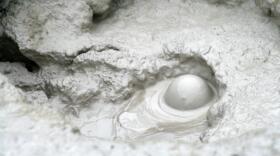Patricia Princehouse, director of the evolutionary biology program at Case Western Reserve University, wants to know how we got man’s best friend, dogs, from wolves.
We may have integrated ourselves into their world.
“There is an extraordinary amount of variation present in, you know, Canis domesticus. You don’t find that in any other domesticated breed, so it’s not just something that we’ve brought to dogs,” Princehouse says. “There’s something about the genome of dogs.”
Most dog breeds are descended from the gray wolf, whom humans met when they first traveled to Europe from Africa. Most scientists believe that we domesticated dogs from the wolves that followed our camps, but Princehouse has another idea.
“The question for me is why would wolves be following us? We’re just small bands of newcomers. They were already perfectly good hunters, but we were newly arrived in a landscape very different from our African ancestors,” Princehouse says. “We may have learned to follow wolves. They knew the geography, they knew the habits of prey animals. We may have integrated ourselves into their world.”
It didn’t take long for early humans to figure out who their best animal friends were. A 30,000-year old dog grave was found in Siberia.
“And he has a mammoth bone in his mouth,” Princehouse says. “He’s been sent to the afterlife with food.”
Exploradio Origins is a weekly feature produced in conjunction with the Institute for the Science of Origins at Case Western Reserve University. Tune in to 89.7 WKSU every Thursday afternoon during All Things Considered to listen to Exploradio Origins. You can find each segment posted online after it airs. Explore all the segments here.









